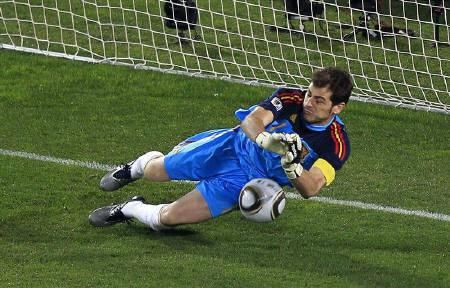World Cup 2014: 5 Reasons Spain Lost So Miserably In The Group Stage

As the defending World Cup and back-to-back European Champions, Spain entered the 2014 World Cup with lofty expectations to repeat, as many experts considered Vicente del Bosque’s squad to be among the greatest national teams in history.
What followed in the group stage sent shockwaves through world soccer. Spain not only lost both games, but were outscored 7-1 by the Netherlands and Chile.
What could possibly have prompted such a flame out? How does such a talented team lose so early in the group stage?
Here are five reasons why Spain couldn’t reach the knockout phase:
Tough Competition
While Spain boast a world-class roster, they faced two very good squads. The Netherlands have an excellent attack, and entered the match with a chip on their shoulder after losing to Spain in the 2010 final in South Africa. Many experts were quick to point out that Chile boast several quality players, including Arturo Vidal, Alexis Sanchez, Eduardo Vargas, Mauricio Isla, and goalkeeper Claudio Bravo. As a South American team, they had a strong contingent of supporters in attendance in Rio de Janeiro.
Predictable Strategy
With the exception of striker Diego Costa, the 2014 roster looked rather similar to the 2010 roster. When a starting XI has a familiar look, it is not difficult for the opposing head coach to game plan. Spain probably needed a shakeup with young players like Jese, Asier Illaramendi, and Alvaro Morata to throw off the competition.
Poor Goalkeeping
While Iker Casillas is considered one of the best goalkeepers in the world, he has been criticized by some for lackadaisical play. His former Real Madrid manager, Jose Mourinho, even benched Casillas in favor of backup Diego Lopez in 2013. Spain could have received a better effort from their man in the net against the Netherlands and Chile. Pepe Reina would probably have been a better choice.
Resting On Laurels
Spain failed to play like Spain, and it seemed as though the squad was expecting to cruise through group play. The overconfidence looked apparent in their passing, which seemed erratic compared to how they played in Euro 2012 and the 2010 World Cup. Their opponents looked one step ahead of them. It was a rude awakening in the second half against the Netherlands, when Spain surrendered four goals in 45 minutes.
Gunning For Goliath
After so much success, Spain may have had “success fatigue.” It’s difficult to maintain such great play for so long, as Brazil proved since Pele’s retirement (Brazil won just two World Cups since 1970). Spain also seemed to be a much different team without their star center back and unsung hero Carles Puyol, whose absence appeared to be too much to overcome. The Netherlands and Chile seemed to relish the opportunity to take down a somewhat vulnerable Spain squad and knew that the champions' reign couldn't last.
In some ways, Spain's downfall should have been expected. Three of the last four world champions couldn’t get out of the first round. Spain had a major challenge in defending their title, and their impressive run in recent years had to end some time.
© Copyright IBTimes 2025. All rights reserved.





















